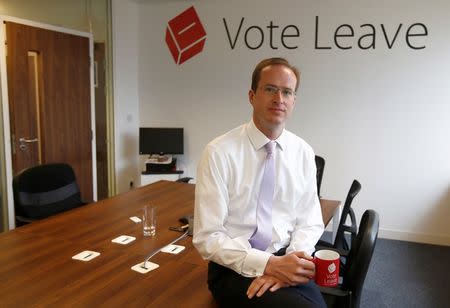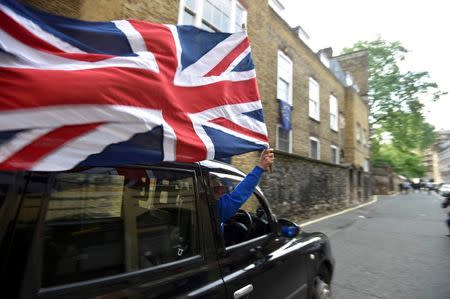Britain's Vote Leave says no need to swiftly begin formal EU divorce negotiations
By Guy Faulconbridge LONDON (Reuters) - Britain should begin informal negotiations on a full settlement governing its post-Brexit relationship with the European Union before invoking Article 50 of the Lisbon Treaty, the chief executive of the Vote Leave campaign said on Saturday. "We don't think there is a need to swiftly invoke Article 50," Matthew Elliott said in an interview, referring to the official notification starting a country's divorce from the EU. "It's best for the dust to settle over the summer and during that time for there to be informal negotiations with other states," he said. After its historic vote to leave the European Union sent political and financial shockwaves around the world, Britain now must decide how fast to formally leave the bloc. London is under pressure from some European leaders to set out a quick timetable for its divorce. European Commission President Jean-Claude Juncker said Britain needed to negotiate its departure immediately. But British politicians say they will not rush -- and are getting some support for a slower timetable from other European capitals, including Berlin. "Quite honestly, it should not take ages, that is true, but I would not fight now for a short time frame," German Chancellor Angela Merkel told a news conference. Prime Minister David Cameron, who called the referendum in 2013, is resigning after failing to convince voters to stay in the EU. He said nothing can be done before a new leader takes power. Politicians from the Leave campaign -- including former London mayor Boris Johnson -- are also pouring cold water on the prospects of a quick divorce. In the interview, Elliot said all aspects of the post-Brexit relationship -- including the British contribution to the EU, access to the single market, extradition agreements and so-called passporting for financial services -- would have to be agreed before invoking Article 50. Such a timetable would allow a stable transition to a new relationship. "There is a whole multiplicity of areas we have to cover," said Elliot. SENSIBLE ARRANGEMENT Britain's vote to leave the bloc it joined in 1973 has dealt the largest setback to European efforts to forge greater unity since World War Two. The vote has also shunted the EU into uncharted territory as no member state has ever left and Article 50 of the EU treaty, which sets out how a state can exit the bloc, offers little detail on how a divorce would actually work. Many chief executives and bank bosses fear quitting the EU could lose them access to Europe's single market of 500 consumers and prevent them selling financial services across the EU from British-based headquarters. Some EU officials and diplomats have warned that lenders, fund managers and investment firms based in London would lose the so called passporting that allow them to operate EU-wide without different national rules and controls. When asked whether the deal Britain would seek would include "passporting" rights for financial services companies in Britain to operate in the EU, Elliott said: "Yes absolutely, it would be a full spectrum agreement covering everything to do with our relationship with the EU." "There is no reason why a sensible arrangement couldn't be put in place for passporting to continue," he said, adding that "there are strong reasons to believe that passporting could continue post Britain leaving the EU." "NO WRIGGLING OUT" Under Article 50, the exiting member who had formally notified the EU of a wish to leave would not participate in discussions at the European Council or in decisions concerning the negotiation. "We feel the better option is not to invoke Article 50 and thereby not be excluded from those key Council meetings allowing our membership of the EU to continue as it is now until we have informally worked out the sort of divorce settlement and then it can be fast tracked and be done overnight," he said. Since the result of the referendum became clear on Friday morning, more than 1.53 million people have signed a petition for a new EU referendum that would require a higher level of support for taking a decision on membership. The referendum is not legally binding on the British government, but Cameron said in his resignation speech outside Downing Street that the will of the people must be respected and that it was "an instruction that must be delivered". Any future British leader would find it impossible to ignore such a clear decision on EU membership. Elliott said the referendum decision to leave the EU had been made by the British people and that it would be implemented. "This is the decision that has been made - it is going to happen. There is no way of wriggling out of it," he said. (Editing by Kate Holton and Alessandra Galloni)

 Yahoo Finance
Yahoo Finance 

